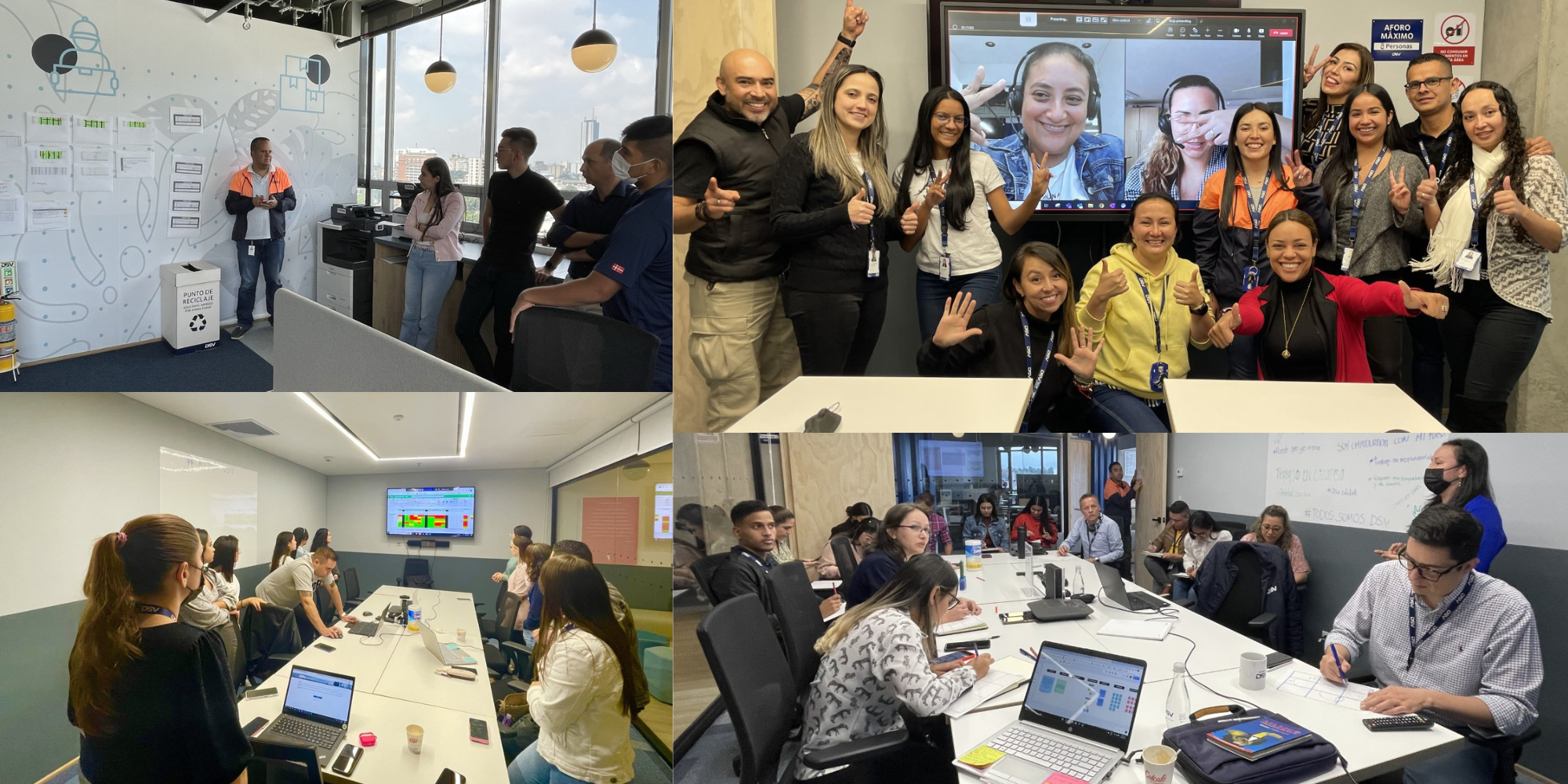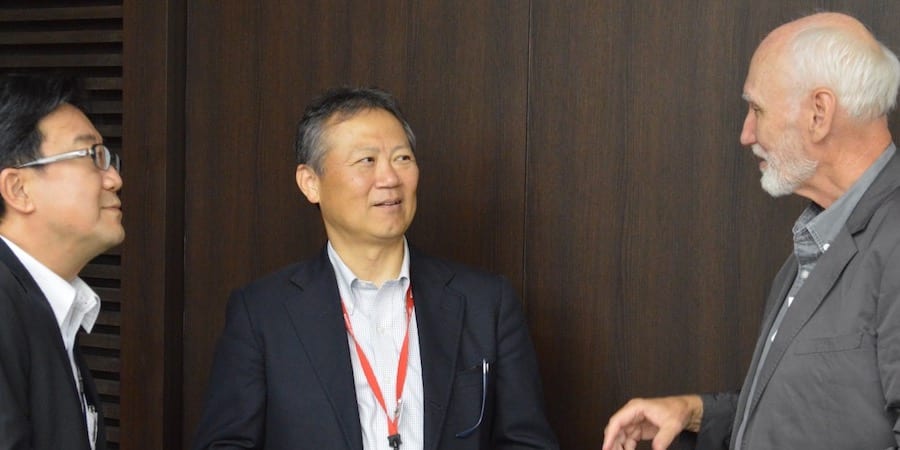
Using lean to make our DNA “stable and flexible”
CASE STUDY – This transport and logistics company in Colombia has turned to Lean Thinking to become more adaptive and ensure an easier post-acquisition integration of new cultures.
Words: Eleana Boada, Angelo Dotto and Natalia Lenis Freire, with Maria del Mar Revelo
The growth strategy of DSV Transport & Logistics is based on mergers and acquisitions. This makes it critical for us to strike a balance between running solid and stable processes and remaining open to change and input coming from the new cultures we incorporate. When, following the pandemic, we realized we needed to transform our way of working to become more adaptable to change and make for a smoother integration of new organizations into the DSV family, turning to Lean Thinking appeared as the obvious choice. We wanted our DNA to become “stable and flexible” (to borrow Toyota’s wording around its product development strategy over the past few years), and there is no better tool for that than lean.
Our Headquarters in Denmark already worked with the lean methodology, but we didn’t want the request to embrace it to come from them, so we got to work. We created the Business Support team, whose task is to spearhead the lean transformation and accompany all departments along the journey. Around the same time, our director gave us all a book, Everything I Know About Lean I Learned in First Grade. The book showed us that lean is a way of thinking we all have in us. That’s when the planets finally aligned, and we were ready to get started.
As a transportation company, we have lots of different actors participating in the process – from transportation to overseas offices, from Finance to local branches. We saw in lean an opportunity to start thinking in a different way, one characterized by standardization in our processes (so that each of our many branches – whether in Colombia or abroad – would deliver services consistently), a clear definition of value, and a commitment to eliminate waste.
When it comes to Lean Thinking, at DSV Colombia we went from nothing to a lot in a very short time, which is why it was critical for us to rely on the support of Lean Institute Colombia. Throughout the journey, they are helping us to coordinate around lean and understand that to be lean requires a cultural shift.
This is, of course, easier said than done. To change mindsets and get people to talk openly about problems, we first had to break the taboo. That’s where the complexity was, especially at the beginning. It is a natural human tendency to hesitate to raise problems. We worked hard to create a safe space for people to talk about waste, and the support of our managers and our director was key to achieving that. As this new approach took root, problems started to pop up and we began to attack the root causes (rather than the symptoms).
As we started to think in value streams rather than silos, we also understood the importance of clear communication. It’s easy to assume that because we are all in the same company everybody’s roles and responsibilities are clear to everyone, but this wasn’t the case at DSV Colombia. We had to better communicate with one another and understand the synergies that exist among different players.
WHAT WE DID
There were three stages to our journey so far:
- A pilot project in Invoicing. We got together with all the people involved in the invoicing value chain, to clearly define process, identify waste and errors, and really understand the current state. By clearly defining everyone’s deliverables and by improving the quality of our data, we realized we could dramatically improve our speed and move closer and closer to our future state.
- Creating a “lean community”. To make change sustainable, we knew we had to spread the lean word and motivate people across DSV Colombia. We did this by sharing the results of the pilot project and the lessons we had learned from it. Our aim was to have people “fall in love” with lean. It took a bit of time, but we achieved it.
- With more and more people interested in lean, we started to bring improvement to other areas of the business, providing additional training where needed. People began to raise their hands and ask, “What about us? When is our turn?”
Today, lean is growing organically at DSV Colombia and the cultural change is palpable. People are learning about the work their colleagues in other departments do and how their work fits into the value chain. We all became more conscious of how our actions and behaviors impact our work and other people’s. By doing so, we all started to realize that no matter what department or local branch we work in, we are all part of one DSV. For an organization like DSV Colombia, in which mergers and acquisitions are an integral part of the business model, to have a clearly defined value chain is very important, in that it allows for flexibility and consistency in the face of ever-changing circumstances. As time went by, people from across the business went from listening into the meetings to actively participating in the improvement, by making suggestions and sharing ideas.
OBSTACLES AND GAINS
It took us six months to get to where we are (and we know the road ahead is still long), and there were many obstacles along the way. For example, some people, especially those more directly engaged in operations, struggled to see the value of lean at first, while others assumed that it was just another project, with a clear deadline. Slowly but surely, we were able to change their thinking, and participation in the transformation increased: as people saw results, they began to warm up to the lean methodology and eventually embraced it as the never-ending journey of improvement that it is.
We also achieved important results since we introduced lean a few months ago. For example, we improved the work around the on-time delivery of invoicing milestones: the goal here is set at 95-98% and, in truth, this was always a “green” KPI for us, but only because we rushed to meet our deadlines at the very last minute. The work wasn’t balanced throughout the month, whereas today, with daily management, we strive to complete tasks weekly so that we work towards the goal without stress or the need for a final rush. This made this specific KPI sustainable.
We also have an ambitious target of zero mistakes in invoicing. We are working on it, but for now we still have around 100 credit notes per month. Even though this KPI is clearly “red”, we are gathering data, categorizing errors, and identifying symptoms and root causes, which makes us confident that we are on the right path.
The biggest gain of all, however, was the transformation of our people, whose lean capabilities are growing by the day. The fact that more and more of them can think critically about problems is very enriching for the company. There can be no improvement of processes, after all, until we develop capabilities. We are teaching our people the importance of humbly looking at our own work and the waste each of us generates, so that engaging with colleagues will be easier and, together, we can all work towards propelling DSV Colombia into the future while recognizing and leveraging the richness and diversity of our DNA.
THE AUTHORS




Read more


FEATURE – A senior executive of a Spanish hotel chain shares an example of how the organization’s management system and visual tools have changed over time.



INTERVIEW – For its 10th anniversary, the Lean Global Network went to Japan for a study mission. Our editor spoke with John Shook on a Shinkansen platform after four days in Toyota City and Nagoya.


CASE STUDY – This insurtech venture has found in Lean Thinking a way to tackle its many scaling issues. It’s grown from two to fifty-five people in less than four years, ultimately thanks to a strong focus on quality.


FEATURE – In the age of complexity and disruption, flowing value to customers as quickly as possible is critical. The new Toyota Flow System strives to address this issue.

